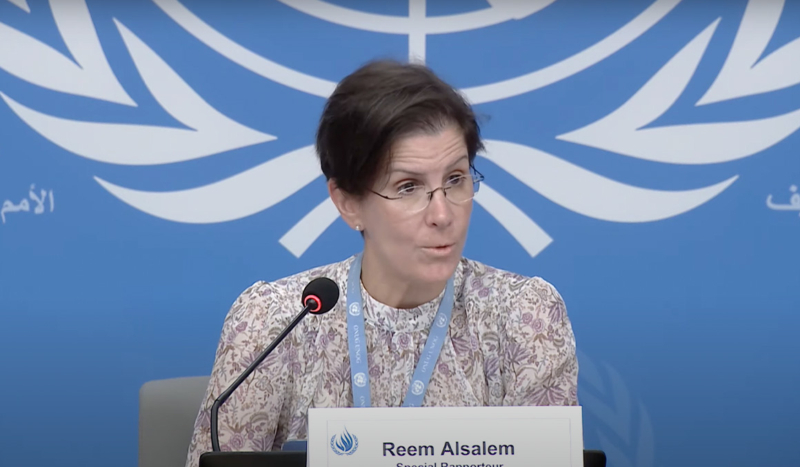
UN Human Rights Council Video Screengrab / YouTube
CV NEWS FEED // In a recent interview, Reem Alsalem, the United Nations (UN) Special Rapporteur on violence against women and girls, said that both prostitution and pornography represent serious human rights violations, not legitimate employment opportunities.
In an interview with the European Center for Law and Justice (ECLJ) released Feb. 6, she discussed her 2024 “Prostitution and violence against women and girls” report, which outlined the dangers and harms linked to prostitution and contended that it is not a harmless industry but rather an urgent human rights violation.
“In my report, I demonstrated that prostitution is a system of exploitation and violence against women and girls,” Alsalem told ECLJ. “It is very gendered; it predominantly affects females, and it is perpetrated by males.”
Alsalem is an independent expert, not a UN staff member. Her role entails reporting on the successes and failures of governments, businesses, militaries, and other entities in addressing violence against women and girls, an issue that “has reached epidemic levels.”
Alsalem notably refused to use the expression “sex work” in her report.
“[T]he term wrongly depicts prostitution as an activity as worthy and dignified as any other work,” the report explained. “It fails to take into account the serious human rights violations that characterize the prostitution system and ‘gaslights’ victims and their experiences.”
The fact that she has used the term in previous reports only bolsters “the point I’m trying to make, that I came to this report and its conclusions because I was overwhelmed by the evidence,” she noted in the interview.
“We cannot ever pretend that we will achieve a society where there is equality between men and women if we normalize that men can buy women’s [and children’s] bodies,” she later said.
She later remarked that her report was surprisingly well received by most countries in the UN general assembly, except for those she labeled as “pimping states” due to her findings of their deliberate profit from practices that harm women and girls.
In addition to those profiting financially from the exploitation of women and girls, those pushing for the legalization of prostitution argue that most women choose this profession as an expression of bodily autonomy and the freedom to make their own decisions, according to Alsalem. They contend that legalizing prostitution would enable women to work officially, providing them with financial security and access to health insurance.
Alsalem clarified that evidence shows that legalizing prostitution does not lead to positive outcomes; instead, it perpetuates a cycle of violence against women and young girls.
The ECLJ facilitated Alsalem’s meetings with politicians involved in the push for legalization of prostitution across Europe.
“Of course, such a visit of that specific UN Special Rapporteur displeased many officials of the Council of Europe,” ECLJ said.
The center later added, “Even with her UN passport, she had difficulties entering the Palais of the Council of Europe… Nevertheless, she had all the meetings she booked and that did not prevent her from spreading the word: prostitution is not work.”
According to the Special Rapporteur, pornography, or “filmed prostitution,” operates the exact same way as prostitution.
“It has the same perpetrators of violence,” she said in the interview, “the same exploitation, the same consequences in terms of all forms of violence inflicted on women and girls, in terms of being exploited by pimps, in terms of also having immense harmful impact on all society, including, I would say, men and boys, [and] younger girls, and harmful to gender equality overall in society.”
Alsalem asserted that the vast majority of pornography is grotesque, degrading, and violent, lacking safeguards such as age verification and measures to prevent trafficking. Despite this, it is deliberately marketed to young women and girls as a lucrative and glamorous pursuit.
She said, “Normalizing consuming pornography has become an issue that is an epidemic as well, on global proportions.”

